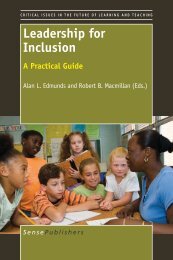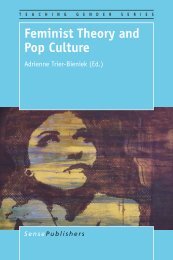TRANSCENDING DISCIPLINARY BOUNDARIESWith this distinction, one can now formulate a question regarding the designationof tc’s: Should the term be restricted to content that requires transformative<strong>learning</strong> (through reflectiveness), or should it also encompass content that dependson deep cumulative <strong>learning</strong> (through reflection)? Meyer <strong>and</strong> L<strong>and</strong>’s tc-definingcharacteristics suggest the former, wherein new meaning arises to be imposed upon(i.e., a reformulated set of expectations, assumptions, <strong>and</strong> world model are appliedto interpret) both old <strong>and</strong> new experience. However, the papers presented at bothconferences suggest the latter, wherein old meaning is imposed upon (i.e., one’sextant expectations are applied to interpret) new experience (Mezirow 1991 p. 11).By clarifying the difference, the proposed theoretical foundation brings thisquestion into focus – <strong>and</strong> into the discourse.Refining representation of liminality. For Meyer <strong>and</strong> L<strong>and</strong>, the ontological shiftassociated with liminality appears to denote externally defined change (Meyer & L<strong>and</strong>2005 p. 376). Following Turner’s metaphor (Turner 1969), they focus on identitytransformation as altered status or place of self within a fixed world. Liminality isunderstood to be experienced individually, while it is also treated as an entity untoitself: one enters into <strong>and</strong> exits from a pre-existing – <strong>and</strong> persisting – liminal space asone’s identity <strong>and</strong> one’s place are transformed in the pre-existing – <strong>and</strong> persisting –world. Students are cast as an exotic other to be placed under anthropologicalobservation. This representation of the encounter <strong>and</strong> its aftermath rests on knowing; itis organized around the principle of presentation of self to the unknown.I propose instead a phenomenological analysis of a universal human pattern thathappens (outside awareness) during encounter with <strong>and</strong> response to the unknown.Continuity of one’s self is preserved; change, if it occurs, appears to occur in theworld. Students are immersed in confusion <strong>and</strong> experience reflectiveness or defensiveness(liminality). This representation of the encounter <strong>and</strong> its aftermath rests onmeaning; it is organized around the process of meaning-making, of interpreting theexistentially unfamiliar, the principle of presentation of the unknown to oneself.The phenomenological analysis conforms to student feedback data from the casestudy course (Schwartzman 2008). It is also supported by an interesting mix ofliterature; <strong>and</strong> makes available more nuanced <strong>and</strong> more wide-ranging interpretationof student experience, <strong>and</strong> thus greater opportunity for intervention <strong>and</strong> support ofstudent <strong>learning</strong>: In Gurwitsch’s phenomenological examination of consciousness,he notes that at the moment of solving a problem, one experiences the perceptualfield through which one has been confronted with the problem undergo[ing]reorganization <strong>and</strong> reconstruction before one’s eyes (Gurwitsch 1964 p. 52). Inanalyzing scientific discovery, Kuhn writes that [a]lthough the world does notchange with a change of paradigm, the scientist afterward works in a differentworld (Kuhn 1996 p. 121).Separation of Concerns: Definition as Explanation for tc Terms <strong>and</strong> TC ConceptsIn themselves, TC terms of art <strong>and</strong> tc characteristics enumerated earlier describebut do not explain, <strong>and</strong> the terminology conflates elements with divergent meanings.41
SCHWARTZMANThey are redefined here (using a taxonomy (Simon 1996) based on the proposedtheoretical foundation), to provide both the explanations <strong>and</strong> the separation ofconcerns (Dijkstra 1972) required for more careful analysis.TC terms of art:– <strong>threshold</strong>: a point of rupture in knowing;– <strong>threshold</strong> concept: existentially unfamiliar (therefore leading to rupture inknowing), educationally critical content of a discipline so fundamental tounderst<strong>and</strong>ing that it permanently transforms the practitioner’s view;– liminality: a period of unresolved explicitness, in the form of reflectiveness ordefensiveness; an observer may have difficulty, in process, identifying whichresponse is occurring;– troublesome knowledge: an anomaly that cannot be avoided, ignored, or made toconform, leading to a rupture in knowing.tc characteristics: If tc <strong>learning</strong> corresponds to a reformulated meaning frame, itqualifies as– transformative: by definition;– irreversible: because meaning frames appear to exist only as dynamic entities inoperation at an unconscious level, no structural integrity attaches to a formermeaning frame <strong>and</strong> holds it together for later re-use;– integrative: because a new meaning frame, by definition, illuminates therelations of interdependence ... binding isolated items into a coherent singlewhole (Dewey 1991 p. 80);– troublesome: by definition, one experiences as troubling any encounter with theexistentially unfamiliar that cannot be ignored, avoided, or made to conform;– bounded new concept space: as the existentially unfamiliar is never exhausted(Dewey notes that it may arise – always unexpectedly – from any source, at anytime, in any place), any concept space is limited in scope.CONCLUSIONS AND FUTURE WORKI have proposed here a reflectiveness/defensiveness framework as a c<strong>and</strong>idate(discipline-independent) theoretical foundation for Threshold Concepts. It isintended to illuminate connections in the body of existing TC literature <strong>and</strong> act asan organizing principle out of which the field can continue to emerge in a coherentway. The explanatory theory defined by it extends beyond description, analogy,<strong>and</strong> metaphor to provide explanation for TC terms of art <strong>and</strong> tc-associatedcharacteristics. The two, in combination, also suggest additional possibilities forTC practice <strong>and</strong> for refining discourse within the developing TC community.In Husserl’s terms, the former constitutes a conceptual system, the latter principlesof theoretical explanation. My exploration <strong>and</strong> development of the reflectiveness /defensiveness framework continues with the case study course in my discipline.The ultimate usefulness of this framework (in itself) to the developing TC42
- Page 1 and 2:
EDUCATIONAL FUTURES: RETHINKING THE
- Page 3 and 4:
EDUCATIONAL FUTURESRETHINKING THEOR
- Page 5 and 6:
A C.I.P. record for this book is av
- Page 7 and 8:
TABLE OF CONTENTS10. Threshold Conc
- Page 9 and 10:
Pax Intrantibus Salus Exeuntibus. L
- Page 11 and 12:
LAND ET ALstudents experience diffi
- Page 13 and 14:
LAND ET ALModePreliminalLiminalPost
- Page 15 and 16:
LAND ET AL(Barker, 1991, p.184). Th
- Page 17 and 18:
LAND ET ALvariations arising from t
- Page 19 and 20:
LAND ET ALform of a model of concep
- Page 21 and 22:
LAND ET ALQuestions of intersection
- Page 24 and 25:
EDITORS’ PREFACEstudents bring to
- Page 26 and 27:
EDITORS’ PREFACEconcepts in the f
- Page 28 and 29:
EDITORS’ PREFACEIn the final illu
- Page 30 and 31:
EDITORS’ PREFACEhence becomes a n
- Page 32 and 33:
EDITORS’ PREFACElearning. This th
- Page 34 and 35:
EDITORS’ PREFACEa lens or ‘way
- Page 36 and 37:
EDITORS’ PREFACEHence learning is
- Page 38 and 39: EDITORS’ PREFACEthe Communitas, w
- Page 40 and 41: EDITORS’ PREFACEBuilding on these
- Page 42 and 43: EDITORS’ PREFACECousin, G. (2009)
- Page 44 and 45: DAVID PERKINSFOREWORDEntrance…and
- Page 46: FOREWORDMeyer, J.H.F., Land, R. & D
- Page 50 and 51: JULIE A. TIMMERMANS1. CHANGING OUR
- Page 52 and 53: CHANGING OUR MINDSKegan’s (1982)
- Page 54 and 55: CHANGING OUR MINDSKegan describes e
- Page 56 and 57: CHANGING OUR MINDSIn fact, Kegan an
- Page 58 and 59: CHANGING OUR MINDSat the epistemolo
- Page 60 and 61: CHANGING OUR MINDSMight a learner r
- Page 62 and 63: CHANGING OUR MINDSreveals an additi
- Page 64 and 65: CHANGING OUR MINDSBendixen, L. D.,
- Page 66: CHANGING OUR MINDSSibbett, C., & Th
- Page 69 and 70: SCHWARTZMANScholarship in liminalit
- Page 71 and 72: SCHWARTZMANTC: the entityThe term T
- Page 73 and 74: SCHWARTZMANA resource for teaching
- Page 75 and 76: SCHWARTZMANunprecedented to attract
- Page 77 and 78: SCHWARTZMANspectrum of scholarship
- Page 79 and 80: SCHWARTZMANrupture and phenomenolog
- Page 81 and 82: SCHWARTZMANfield(s) of one’s cons
- Page 83 and 84: SCHWARTZMAN36DATA: PARTICULARS GIVI
- Page 85 and 86: SCHWARTZMANchallenge than interpret
- Page 87: SCHWARTZMANStrategies for Teaching:
- Page 91: SCHWARTZMANLoder, J. (1981). The tr




